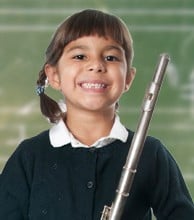What’s the Best Age for Kids to Start Learning an Instrument?
Parents and teachers often wonder: What’s the best age for my child to start learning an instrument? While every child develops at their own pace, research in music education and decades of classroom experience suggest clear patterns. The “right time” depends on your child’s readiness, interests, and the type of instrument.
Kindergarten and 1st Grade: Starting with Violin
One of the best instruments for very young children is the violin. Unlike woodwinds or brass, violins come in fractional sizes (as small as 1/16), making them perfectly suited for kindergartners and first graders. At this age, lessons focus on posture, rhythm, ear training, and playful bowing exercises.
Early violin study builds listening skills, coordination, and musical confidence. And because the instrument is scaled to fit the child, success comes quickly.
👉 For parents and teachers looking for resources designed especially for young violin beginners, see The Violin Fun Book and My First Violin Book.
Early Elementary: Ages 6–9
Between ages six and nine, most children develop the finger strength, focus, and reading skills needed for structured lessons. At this stage, popular choices include piano, guitar, ukulele, and recorder. Many school orchestra programs also begin with strings such as violin, viola, cello, and bass.
This is also when children are ready to join their first ensembles, which motivates practice and builds teamwork.
Upper Elementary: Ages 9–11
By fourth or fifth grade, most schools introduce band and orchestra. This is the natural entry point for woodwinds like flute and clarinet, brass instruments like trumpet and trombone, and percussion such as snare drum or mallets.
At this age, children have the lung capacity and coordination for these larger instruments, and ensemble performance becomes a major part of the experience.
Middle School and Beyond: Ages 11+
It’s never too late to start. Older beginners often progress quickly thanks to maturity, focus, and self-motivation. Many middle and high school students pick up guitar, piano, or band instruments for the first time and thrive.
Signs Your Child Is Ready
Instead of focusing only on age, watch for: the ability to focus for 10–15 minutes, an interest in music (singing, tapping rhythms, asking questions), developing fine motor skills or breath control, and the willingness to follow directions in a group. If your child shows these signs, they’re ready to begin—whether they are five, eight, or eleven.
Why Early Music Education Matters
Starting music early builds more than just musical skills. Benefits include stronger language and reading ability, better math performance through rhythm and patterns, improved memory and focus, increased confidence and self-discipline, and a lifelong appreciation for music.
The Bottom Line
So, what’s the best age for kids to start learning an instrument? For many, ages five to seven are ideal for beginning violin thanks to its size and accessibility. Ages six to nine are excellent for piano, ukulele, and recorder, while most woodwinds, brass, and percussion begin in grades four or five.
The real answer: the best age is when your child is excited and ready to explore music. Whether it’s violin in kindergarten or trumpet in fifth grade, instrumental music offers skills and joy that last a lifetime.
